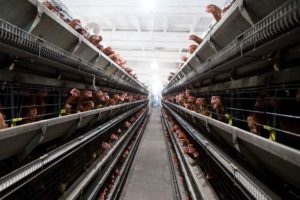What Are “Ag-Gag” Laws and Why Should Humanists Oppose Them?

A federal judge ruled in early July that Utah’s 2012 “ag-gag” law is unconstitutional. The law criminalized whistleblowing in slaughterhouses and factory farms by preventing citizens employed in a facility under false pretenses from recording without consent.
“Ag-gag” laws originated in the 1990s after a series of undercover investigations revealed the horrific truths of factory farms and slaughterhouses as animals were being beaten, kicked, mutilated, and ground up alive. Undercover investigations also exposed antibiotic-resistant superbugs, deplorable working conditions, and tipped off the FDA to an operation that led to a mass recall of farm eggs due to salmonella poisoning.
US District Judge Robert Shelby declared that the Utah ban violated the First Amendment’s free-speech protections, thereby rejecting the state’s defense that pointed to “two types of harm it believes necessarily result from such lies: (1) danger to animals and employees, and (2) trespass over property persons otherwise could not access.” But Judge Shelby noted, “There is no evidence in the record that lying to gain access to an agricultural facility will necessarily harm animals or employees,” and went on to say that:
[P]lenty of lies that fall within the purview of the Act would cause no harm at all to animals or workers—the applicant who says she has always dreamed of working at a slaughterhouse, that he doesn’t mind commuting, that the hiring manager has a nice tie. Because the Act as written criminalizes lies that would cause no harm to animals or workers—i.e., lies that enjoy First Amendment protection—this rationale fails to place the lying provision outside of First Amendment scrutiny.
The Animal Legal Defense Fund (ALDF), People for the Ethical Treatment of Animals (PETA), and Amy Meyer, the director of the Utah Animal Rights Coalition (UARC), challenged the ban after Meyer was arrested while filming operations at Dale T. Smith & Sons Meat Packing Company in 2013. She was charged with a class B misdemeanor for violating the law, but the charges were later dismissed. “It should never be a crime to tell the story of an animal who is being abused and killed, even if it’s for food,” Meyer said in a statement on the UARC website.
Judge Shelby concluded, “Utah undoubtedly has an interest in addressing perceived threats to the state agricultural industry, and as history shows, it has a variety of constitutionally permissible tools at its disposal to do so. Suppressing broad swaths of protected speech without justification, however, is not one of them.”
This decision creates a precedent for the other sixteen states that have adopted “ag-gag” laws, as does ALDF’s case in Idaho, which was ruled unconstitutional in 2015 but is now pending in the Ninth Circuit after Idaho filed an appeal.
Targeting whistleblowers in order to censor and hide the undertakings of animal agribusinesses further perpetuates systems that threaten workers’ rights, consumer health and safety, and First Amendment freedoms. As humanists who strive to live informed, accountable, and just lives, we have a responsibility to recognize the ethical, ecological, and social problems of our consumption decisions, and even more so, a responsibility to dismantle them.
The Food Empowerment Project is one resource that provides insight into the vast destructive expanse of our agricultural system. They report that in the United States, animal agriculture accounts for half of all the freshwater used in a year, while commercial fishing has driven many species toward extinction and has increased the strain on our oceans. Additionally, residents who live near factory farms—typically communities of color and low-income households—describe a wide range of health issues associated with high waste production. This waste, along with agricultural chemicals and emitted gasses, go on to pollute the environment and threaten workers and marginalized populations. Lastly, the expansion of factory farms and US agricultural methods implemented abroad displace indigenous populations residing in rural areas.
This only scratches the surface of the disproportional damage done by agribusiness and, more importantly, our food choices. While “ag-gag” laws attempt to hide the horrific inner workings of factory farms, insurmountable evidence already suggests it’s time, for those of us with the ability to do so, to consider what we eat.
